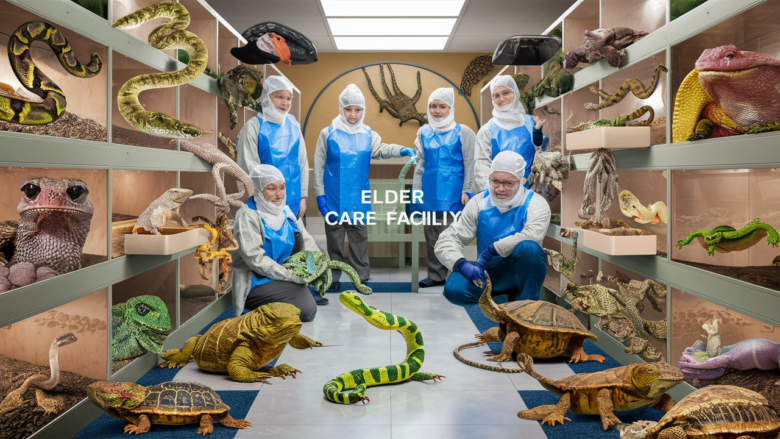As reptiles age, their care requirements evolve significantly. Understanding the unique challenges associated with senior reptile care, including aging turtle health issues, geriatric snake management, and elderly lizard support, is crucial for ensuring their well-being and quality of life. This article offers in-depth insights and practical advice for reptile keepers dealing with aging pets.
Understanding Senior Reptile Care
Understanding Senior Reptile Care emphasizes the unique needs of aging reptiles, including appropriate habitat modifications for comfort, dietary adjustments for nutrition, and consistent veterinary check-ups to monitor health and vitality. Common signs of aging, such as reduced mobility, changes in appetite, and skin issues, require attention to adapt their environment, ensuring a supportive and enriching space for their senior years.
Identifying Aging Turtle Health Issues
Aging turtles often face specific health issues, including **shell disease**, which can arise from poor environmental conditions. Regular checks and proper UVB lighting are crucial for prevention.
**Metabolic Bone Disease** (MBD) frequently affects older turtles, manifesting in brittle bones and deformities. A calcium-rich diet and careful exposure to sunlight can mitigate risks.
**Respiratory infections** are another concern as turtles age. Key signs include wheezing and lethargy. Maintaining clean, warm habitats helps prevent infections; prompt veterinary evaluation is recommended for symptoms.
Dietary considerations must shift to support aging turtles, emphasizing softer, nutritious foods rich in vitamins. Fiber is essential, so integrating leafy greens enhances digestion and overall health.
Veterinary assistance should be sought when behavioral changes, weight loss, or feeding reluctance occur. Regular health checks at the vet can catch potential issues early, ensuring prompt intervention.
Geriatric Snake Management
Managing geriatric snakes presents unique challenges due to metabolic slowdown, altered appetite, and behavioral changes. Adjust enclosure temperatures and humidity levels as needed, while monitoring for signs of illness like kidney disease and scale rot.
Dietary adjustments are critical; provide nutrient-rich food and consider smaller, more frequent feedings to entice a diminished appetite. Regular veterinary check-ups are essential for early detection of age-related ailments and proper management strategies tailored for elderly specimens.
Understanding behavioral changes, such as increased lethargy or reduced activity, can indicate discomfort or health issues. Observing these shifts closely allows for timely intervention, ensuring a better quality of life for your aging snake.
Elderly Lizard Support Strategies
Elderly lizards require tailored support, focusing on **temperature regulation** to enhance their metabolic functions. Adjust ambient conditions to create thermal gradients, allowing lizards to self-regulate body heat effectively.
Dietary adjustments are crucial; offer easily digestible foods with higher calcium and vitamin supplementation. Incorporate softer textures to cater to decreased jaw strength, ensuring adequate hydration through moisture-rich vegetables or supplements.
Environmental enrichment is essential to stimulate their cognitive and physical abilities. Introduce varied hiding spots, climbing structures, and interactive elements to encourage activity and natural behaviors, helping to alleviate boredom and stress.
Recognizing distress in elderly lizards can be challenging. Observe changes in behavior, feeding habits, or movement patterns. Signs of pain may include lethargy, refusal to bask, or unusual postures, signaling the need for intervention.
When distress is noted, promptly assess their environment for temperature and humidity consistency. If health issues persist, consult a veterinarian specializing in reptiles to explore potential treatments or palliative care options, ensuring their quality of life remains a priority.
Creating a Comprehensive Senior Reptile Care Plan
Creating a comprehensive senior reptile care plan is essential for ensuring the health and quality of life for aging reptiles. A proactive approach includes regular veterinary consultations, personalized habitat adaptations, and specific dietary modifications tailored to each species.
For turtles, monitor for common aging issues such as shell deformities or respiratory problems. Provide UVB lighting and a varied diet rich in calcium. Ensure the water quality is optimal to prevent infections.
For geriatric snakes, implement regular weight checks and monitor for signs of shedding difficulties. Adjust humidity levels in their habitat and offer prey items that are easier to consume. Maintaining a consistent temperature gradient is critical for proper metabolism.
In elderly lizards, focus on maintaining hydration and adjusting basking spots for increased thermal comfort. Check for weight loss or lethargy, and provide soft, easily digestible foods to support digestion. Encourage gentle exercise to preserve muscle tone.
Developing a comprehensive care plan involves creating checklists that include:
**Dietary Needs:**
– High-quality, age-appropriate food
– Supplements (calcium, vitamins)
– Access to fresh water
**Habitat Requirements:**
– Optimized temperature ranges
– Proper humidity levels
– Enrichment items (logs, hides)
**Regular Health Assessments:**
– Routine weight checks
– Inspection for signs of illness or distress
– Scheduled veterinary visits
By following these guidelines, reptile caregivers can proactively address geriatric health issues and enhance life quality for senior reptiles, ensuring they thrive in their golden years.
Conclusions
Caring for senior reptiles requires commitment and knowledge of their unique health challenges and care needs. By understanding aging-related issues in turtles, snakes, and lizards, owners can provide tailored support that enhances their pets’ quality of life. With proper management, senior reptiles can thrive in their later years.



